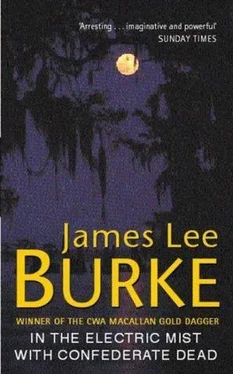"What's his name?"
"Don't know, don't want to know. Ax yourself something. Why y'all always come to a nigger to solve your problem? We ain't got nothing like that in a black neighborhood."
"We'll see you around, Camel. Thanks for your help. Say, what's the name of the black guy working the bus depot?"
"I travel by plane, my man. That's what everybody do today," he said, and licked the top of the peeled egg before he put it in his mouth.
For years the Airline had been the main highway between Baton Rouge and New Orleans. When I-10 was built, the Airline became a secondary road and was absorbed back into that quasi-rural slum culture that has always characterized the peckerwood South: ramshackle nightclubs with oyster-shell parking lots; roach-infested motels that feature water beds and pornographic movies and rent rooms by the day or week; truck stops with banks of rubber machines in the restrooms; all-night glaringly lit cafes where the smell of fried food permeates the counters and stools as tangibly as a film of grease.
I went to three clubs and got nowhere. Each time I walked through the door the bartender's eyes glanced up to meet me as they would somebody who had been expected all evening. As soon as I sat at the bar the girls went to the women's room or out the back door. The electronic noise of the country bands was deafening, the amplified squelch in the microphones like metal raking on a blackboard. When I tried to talk to someone, the person would nod politely in the din as though a man without vocal cords were speaking to him, then go back to his drink or stare in the opposite direction through the layers of cigarette smoke.
I gave up and walked back to my truck, which was parked between the clapboard side of a nightclub and a squat six-room motel with a small yellow lawn and a dead palm tree by the drive-in registration window. The air smelled of creosote and burnt diesel fuel from the railway tracks by the river, dust from the shell parking lot, liquor and beer from a trash barrel filled with empty bottles. The sky out over the Gulf trembled with dry lightning.
I didn't hear her behind me.
"Everybody on the strip knew you were coming two hours ago, cutie," she said.
I turned and squinted my eyes at her. She drank out of her beer bottle, then puffed off her cigarette. Her face was porcine, her lipstick on crooked, her dyed red hair lacquered like tangled wire on her head. She put one hand on her hip and waited for me to recognize her.
"Charlotte?"
"What a memory. Have I tubbed up on you?"
"No, not really. You're looking good."
She laughed to herself and blew her cigarette smoke at an upward angle into the dark.
Thirty years ago she had been a stripper and hooker on Bourbon Street, then the mistress of a loanshark who blew his brains out, the wife of an alcoholic ex-police sergeant who ended up in Angola for doping horses at the Fairgrounds, and the last I heard the operator of a massage parlor in Algiers.
"What are you doing out here on the Airline?" I said.
"I run the dump next door," she said, and nodded toward the motel. "Hey, I got to sit down. I really got crocked tonight." She shook a wooden chair loose from the trash pile by the side of the nightclub and sat down in it with her knees splayed and took another drink from her beer bottle. An exhaust fan from a restroom was pinging above her head. "I already heard what you're looking for, Streak. A guy bringing the chickens in from the country, right?"
"Do you know who he is?"
"They come and they go. I'm too old to keep track of it anymore."
"I'd sure like to talk to this guy, Charlotte."
"Yeah, somebody ought to run an iron hook through his balls, all right, but it's probably not going to happen."
"Why not?"
"You got the right juice, the play pen stays open."
"He's connected?"
"What do you think?"
"With the Balboni family?"
"Maybe. Maybe he's got juice with the cops or politicians. There's lots of ways to stay in business."
"But one way or another, most of them go down. Right?"
She raised her beer bottle to her mouth and drank.
"I don't think anybody is going to be talking about this guy a whole lot," she said. "You hear stories, you know what I mean? That this guy you're looking for is somebody you don't want mad at you, that he can be real hard on his chippies."
"Is it true?"
She set her empty bottle down on the shells and placed her hands loosely in her lap. For a moment the alcoholic shine left her eyes and her expression became strangely introverted, as though she were focusing on some forgotten image deep inside herself.
"When you're in the life, you hear a lot of bad stories, cutie. That's because there aren't many good ones," she said.
"The man I'm looking for may be a serial killer, Charlotte."
"That kind of guy is a john, not a pimp, Streak." She leaned on her forearms, puffing on her cigarette, staring at the hundreds of bottle caps pressed into the dirt at her feet. Her lacquered hair was wreathed in smoke. "Go on back home. You won't change anything here. Everybody out on this road signed up for it one way or another."
"Nobody signed up to be dead."
She didn't reply. She scratched a mosquito bite on her kneecap and looked at a car approaching the motel registration window.
"Who's the main man working the bus depot these days?" I said.
"That's Downtown Bobby Brown. He went up on a short-eyes once. Now he's a pro, a real piece of shit. Go back to your family, Streak, before you start to like your work."
She flipped her cigarette away backhandedly, got to her feet, straightened her dress on her elephantine hips, winked at me as though she might be leaving a burlesque stage, and walked delicately across the oyster shells toward her motel and the couple who waited impatiently for her in the heat and the dust and the snapping of an electric bug killer over the registration window.
YOU CAN FIND THE PREDATORS AT THE BUS DEPOT ALMOST ANY time during the twenty-four-hour period. But they operate best during the late hours. That's usually when the adventurers from Vidalia or De Ridder or Wiggins, Mississippi, have run out of money, energy, and hope of finding a place to sleep besides an empty building or an official shelter where they'll be reported as runaways. It's not hard to spot the adventurers, either. The corners of their mouths are downturned, their hair is limp and lies like moist string on their necks; often their hands and thin arms are flecked with home-grown tattoos; they wash under their arms with paper towels and brush their teeth in the depot restroom.
I watched him walk across the waiting room, a leather satchel slung on a strap over his shoulder, his eyes bright, a rain hat at an angle on his head, his tropical white shirt hanging outside his khakis. A gold cross was painted on the side of his satchel.
The two girls were white, both blond, dressed in shapeless jeans, tennis shoes without socks, blouses that looked salt-faded and stiff with dried perspiration. When he talked with them, his happy face made me think of a mythical goat-footed balloonman whistling far and wee to children in springtime. Then from his satchel he produced candy bars and ham sandwiches, a thermos of coffee, plums and red apples that would dwarf a child's hand.
The girls both bent into their sandwiches, then he was sitting next to them, talking without stop, the smile as wide as an ax blade, the eyes bright as an elf's, the gold cross on his satchel winking with light under his black arm.
I was tired, used up after the long day, wired with too many voices, too many people on the hustle, too many who bought and sold others or ruined themselves for money that you could make with a Fuller-brush route. There was grit in my clothes; my mouth tasted bad; I could smell my own odor. The inside of the depot reeked of cigar butts and the diesel exhaust that blew through the doors to the boarding foyer.
Читать дальше












